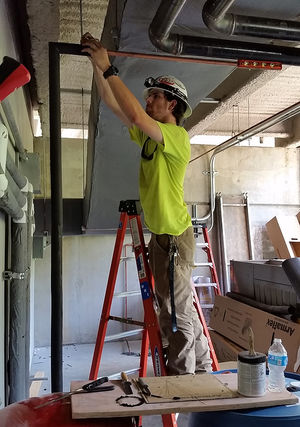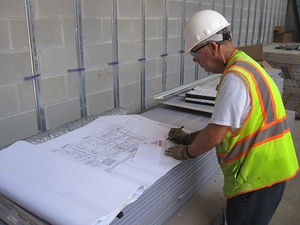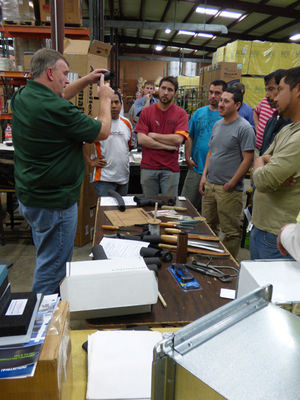 It’s been coming on for a while. Many younger workers have chosen paths other than joining the skilled trades for almost two decades. The recession of 2008-2009 also caused some trades to layoff qualified employees, who found work elsewhere. Today our industry sees a workforce of HVAC, mechanical contractors and insulation contractors that typically skews middle-aged or older. This skilled labor shortage makes us take a good, hard look at succession planning in small businesses and think about who will be qualified to do this work in the future.
It’s been coming on for a while. Many younger workers have chosen paths other than joining the skilled trades for almost two decades. The recession of 2008-2009 also caused some trades to layoff qualified employees, who found work elsewhere. Today our industry sees a workforce of HVAC, mechanical contractors and insulation contractors that typically skews middle-aged or older. This skilled labor shortage makes us take a good, hard look at succession planning in small businesses and think about who will be qualified to do this work in the future.
According to the Bureau of Labor Statistics (BLS), construction and extraction jobs are expected to grow 11% from 2016 to 2026, a gain of 747,600 new jobs. That’s faster than the average growth of jobs overall. Couple that with a low unemployment rate, and there just won’t be enough bodies to fill all the positions that will be created.
 If you look at insulation workers alone their growth is expected to be about 5% in the 2016-2026 time period. As many business owners and senior installers approach retirement age, they need to backfill those positions with highly qualified newcomers who can make up for the years of experience that will be lost to attrition. Some mechanical insulation programs require a 4-year apprenticeship which provides the hands-on training a new hire needs to hone his or her skills. Usually a high school diploma is all that required, but courses in basic math, woodworking, mechanical drawing, algebra, and general science are considered helpful for all types of insulators. That training takes time, so a steady stream of candidates must enter the pipeline all the time to keep staffing at full capacity.
If you look at insulation workers alone their growth is expected to be about 5% in the 2016-2026 time period. As many business owners and senior installers approach retirement age, they need to backfill those positions with highly qualified newcomers who can make up for the years of experience that will be lost to attrition. Some mechanical insulation programs require a 4-year apprenticeship which provides the hands-on training a new hire needs to hone his or her skills. Usually a high school diploma is all that required, but courses in basic math, woodworking, mechanical drawing, algebra, and general science are considered helpful for all types of insulators. That training takes time, so a steady stream of candidates must enter the pipeline all the time to keep staffing at full capacity.
The time to prepare for this shortage is already past, but some industries have been tackling the issue head on. For a while after the 2008 recession, some unions reduced the numbers of members they accepted. They are now accepting new members at higher rates allowing young people to enter apprenticeships there. Unions like the International Association of Heat and Frost Insulators and Allied Workers Local Apprenticeship Training Programs offer a 4 or 5 year training program with 1,800 hours per year of on-the-job training with journeyman insulators.
 “Young workers will put their classroom knowledge to the test in real-world jobs with professional supervision in those Federally Registered Apprenticeship Programs. All the apprenticeship training is done throughout the country between a partnership of the union and the contractors in the area,” says Thomas Haun, IIIATF Administrator of the Heat and Frost Insulators and Allied Workers in Maryland. “This gives the next generation of our workforce the best chance to be successful in our industry and the opportunity to earn a living wage while getting the expert training needed at no cost to them.”
“Young workers will put their classroom knowledge to the test in real-world jobs with professional supervision in those Federally Registered Apprenticeship Programs. All the apprenticeship training is done throughout the country between a partnership of the union and the contractors in the area,” says Thomas Haun, IIIATF Administrator of the Heat and Frost Insulators and Allied Workers in Maryland. “This gives the next generation of our workforce the best chance to be successful in our industry and the opportunity to earn a living wage while getting the expert training needed at no cost to them.”
Trade associations like the National Insulation Association (NIA) offer certification for mechanical insulators in their Thermal Insulation Inspector Program. Besides giving insulators an additional skill to enhance their career, it is a way that industry knowledge and best practices are passed to a new generation of insulators.
According to an article in the October 2019 issue of Snips magazine , the publication of the Sheet Metal and Air Conditioning Contractor’s Association, another way to fill the pipeline of workers is to actively recruit military veterans when they leave service. Groups like Helmets to Hardhats and SMART Heroes are nonprofit programs that connect retired and transitioning active-duty service men and women with skilled training and quality career opportunities in the construction industry.
 Mechanical contractors, sheet metal contractors, HVAC and plumbing contractors and insulators alike, need to do a better job of communicating that these jobs are rewarding careers. The next generation needs to see a promising future in these career paths. Communicating that these are good paying jobs that don’t require a college degree, means no student debt hanging over them for decades to come. According to BLS, the median annual wage for mechanical insulators in 2017 was $45,550. And just because no degree is required, they will still become highly skilled workers, developing a craft that not just anyone can do. Proper installation of insulation is critical to the function of mechanical systems.
Mechanical contractors, sheet metal contractors, HVAC and plumbing contractors and insulators alike, need to do a better job of communicating that these jobs are rewarding careers. The next generation needs to see a promising future in these career paths. Communicating that these are good paying jobs that don’t require a college degree, means no student debt hanging over them for decades to come. According to BLS, the median annual wage for mechanical insulators in 2017 was $45,550. And just because no degree is required, they will still become highly skilled workers, developing a craft that not just anyone can do. Proper installation of insulation is critical to the function of mechanical systems.
Armacell supports the promotion of the insulator’s future. Our team of application specialists travels the country doing free jobsite training and ArmaFlex Qualified Install Program (AQIP) sessions for insulators who are new to the industry or want a refresher. Our team has developed a relationship with the Association of Heat and Frost Insulators, at the national and local level, offering application training at many of their local training facilities. We can also offer training demonstrations to vocational and technical schools as well. If your business wants to take advantage of these training sessions, contact us.
The times are changing and we need to pass along knowledge to the next generation of workers now. The future of our industry depends on it.
